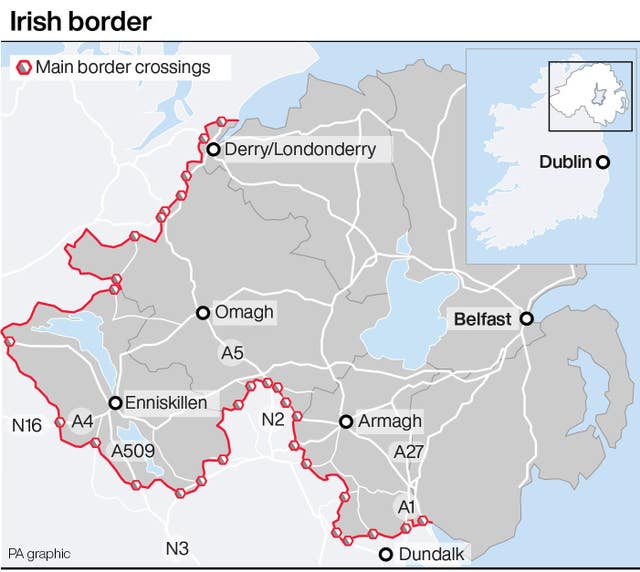Impossible to police 300 crossing points on Irish border, PSNI chief tells PM
PSNI chief Simon Byrne said he issued the advice in a ‘candid conversation’ with the Boris Johnson.

Northern Ireland’s chief constable has told Boris Johnson that it is not possible to police the Irish border with his current officer numbers.
Simon Byrne said he took part in a “candid” 30-minute conversation with the Prime Minister by video call last Friday.

“We were face to face on a video call for over half an hour,” he said.
“It was a very open conversation, trying to tell him we saw that it was nigh-on impossible to try and police over 300 crossings with the amount of police officers we had.
“It was a candid conversation, he was responsive to what we said and at the end of the day, how it landed and what he thought… you’re going to have to ask him.”
Earlier this week it emerged that under the Prime Minister’s Brexit plan, Northern Ireland would remain in the European single market for goods but leave the customs union.
Proposals suggest that most customs checks could be carried out electronically but a small number of physical checks would be required either at business premises or at points on the supply chain.
Mr Byrne told a meeting of the Northern Ireland Policing Board that he has “made it clear” to the Northern Ireland Office (NIO) that police will not “staff any form of border security”.
“We have been working closely with the Northern Ireland Office to understand our constitutional position in relation to any proposed changes to border arrangements, and I have been clear with the NIO in particular that it will not be the role of the PSNI to staff any form of border security,” he said.
“We are clearly there to facilitate normality and day-to-day policing, but not to carry out custom checks and the function of other agencies in whatever proposal is or isn’t agreed in the next few weeks and indeed I have taken legal advice on that basis to confirm to me the independence of the office of chief constable and the duties I have to make sure that police officers are used for legitimate policing purpose.”
Asked about dissident republican and loyalist paramilitaries, Mr Byrne responded: “As we stand at the moment we are ready for a range of different scenarios, but we don’t anticipate immediate change in the threat from either the nationalist or either indeed the loyalist community that will hold different views about how Brexit plays out.”
The meeting of the Northern Ireland Policing Board approved a request by Mr Byrne for additional officers to bring his workforce up to around 7,500 officers.
“Whilst £40 million, which is our estimate of the cost, sounds a lot of public money, if you think about it in very broad sum terms, that’s £2 per resident per year. I think it is a wise investment that will give us more presence,” Mr Byrne said.
Board chairwoman Anne Connolly said there was no dissent among the board on the request.
“Seeing all of the pressures the PSNI is under, without Brexit, certainly with legacy, the board was more than happy to support that.
“We will be following that through with a proper business case that has to go to the Department of Justice,” she said.
“That may not even be enough either depending on how Brexit goes.”





